Your donation will support the student journalists of Kirkwood High School. Your contribution will allow us to purchase equipment and cover our annual website hosting costs.
On Wednesday, Jan. 6, at approximately 7:30 p.m., three KSD schools were vandalized with racial slurs. In this article, TKC highlights five Black students connected to Kirkwood, who explain their thoughts and feelings regarding the hate crime and their feelings on Kirkwood’s action following the situation. Art by Graesen Joyce
Black students’ perspectives on Jan. 6 hate crime
February 19, 2021
On Wednesday, Jan. 6, at approximately 7:30 p.m., three KSD schools were vandalized with racial slurs. The already flooded comment section of TKC’s posts regarding the hate crime regained momentum after released mugshots revealed one of the perpetrators was Black. Many Black students still felt that the N-word spray painted on a KHS wall was a hate crime, regardless of who was involved, while other students argued that it was not. In this article, TKC highlights five Black students connected to Kirkwood, who explain their thoughts and feelings regarding the hate crime and their feelings on Kirkwood’s action following the situation.
Anonymous
Art by Graesen Joyce. Even after moving out of Kirkwood and into a different school district, Anonymous still hears of the racial issues within KSD.
Even after moving out of Kirkwood and into a different school district, Anonymous still hears of the racial issues within KSD. Attending KSD until middle school, Anonymous said they had not experienced much racism in their time at Kirkwood, noting that the teachers seemed kind to everyone. They said they used to love how Kirkwood did not appear to have racial discrimination, but now sees the issues Black students are facing over social media.
“I’ve heard a lot about sick incidents going on, [and the hate crime] is one of them,” Anonymous said. “I just [see] people putting on their stories how Kirkwood is so racist and how they treat [Black students] differently, and how a lot of Caucasian kids are doing Black face, painting their faces and saying the N-word.”
After KPD revealed one of the people involved was Black, people began commenting things like, “The irony is just so incredibly rich,” or “It’s not a hate crime anymore,” Anonymous said. They said they were angry and confused by these comments, thinking it was weird how hard people in the comments were trying to argue with the Black students on their opinions regarding the vandalism.
“This doesn’t affect [the white commenters], it just doesn’t. If someone called them the N-word to their face they’d probably just laugh about [it],” Anonymous said. “[I’m a Black person] saying this is not ok [and that] this is a hate crime or the closest thing to it, and everyone else is saying it, [so] that’s the end of the story.”
Prior to learning the identities of the individuals involved, a group of KHS students organized a march in response to the Kirkwood Police Department (KPD) not labeling the vandalism a hate crime. This march was also a way to give their Black peers support. Anonymous said they loved the march but were sad their friends felt like Kirkwood would not be able to grow from this.
“I was going to go with a friend, but then she said, ‘In a way, I don’t really see a point because Kirkwood is so racist that no matter what we do, nothing will change,’” Anonymous said. “That made me sad because I hate that [Black students at Kirkwood] have to feel that way and feel that, even if they do protest and even if they do share their voices, nothing will happen.”
Anonymous said they saw some of their white friends attend the march. They explained that support from non-Black people is what the Kirkwood community needs in order to move in a positive direction.
“I did see some of my friends, [who] happen to be white, and they were protesting,” Anonymous said. “ I love people like them. They say that while they don’t exactly feel the same and they don’t go through the same stuff, that they [still] support [us]. That’s what I love because those are the types of people we need in Kirkwood.”
Devin Corley
Art by Graesen Joyce. Devin Corley, senior, remembers many racist situations where he felt the administration did not deal with the situation to the best of their ability.
Over the past few weeks, many have expressed frustration with Kirkwood’s neglect of their Black students’ feelings regarding racial issues within the community. Devin Corley, senior, remembers many racist situations where he felt the administration did not deal with the situation to the best of their ability.
“[A KHS history teacher was reading a book] and the N-word came up and he said it. Then when everyone in the classroom told him they felt uncomfortable with him saying [the N-word], he tried to [justify] how he could say it. When [it was taken to the] administration, [they] didn’t really care for it, and they didn’t really take it seriously,” Corley said. “With instances involving race, I feel like it can be hard, but I also feel like sometimes Kirkwood doesn’t always listen to [its] students’ concerns.”
After KPD stated they did not consider the vandalism to be a hate crime, many people argued about whether or not this was justified. Corley said he was confused about many of the commenters’ agendas, and thought many of them sounded ignorant.
“[The commenters] were just being ignorant about stuff, and they would bring up things that didn’t really have to do with the vandalism. I just feel like overall the comments just got really musty after a while,” Corley said. “How is it OK for a white person to try to say there’s no lack of representation at Kirkwood, but when a Black person says there is, we’re crazy? It showed how low some people will go, but it wasn’t surprising to see how many people were saying ignorant stuff [simply] because they just wanted to be heard.”
As soon as TKC posted the surveillance footage, accounts began joking about the individuals involved. Many people immediately expressed their frustration regarding the humor others were bringing into the situation. Corley said he saw this as a representation of how Kirkwood deals with these situations with lack of seriousness.
“[The joking comments are a] prime example of why people think that they can get away [with things like the vandalism] because all of our students think everything is a joke,” Corley said. “It was just disrespectful from the get go to try and make this into some funny situation because it definitely was not a funny situation.”
Corley said that in order for Kirkwood to grow from this, KSD has to make tangible changes and take action in its schools. He said the administration needs to better understand and listen to their Black students, so that they know how to respond in a more effective way when situations involving race occur.
“It is hard coming to a predominantly white school in a rich, white town. A lot of times Kirkwood doesn’t take much stuff seriously, especially when it comes to racism,” Corley said. “No matter how big or how small the incident may be, if Kirkwood tackled it head first every time, maybe the students wouldn’t be so upset and maybe things like [the vandalism] wouldn’t happen [as often].”
DemBari Taneh
Art by Graesen Joyce. DemBari Taneh, senior, said he often finds himself in situations where his peers are being subtly racist and do not know they are being offensive.
In the past few weeks, many Black students at Kirkwood said they have frequently experienced racism in the community prior to the vandalism. DemBari Taneh, senior, said he often finds himself in situations where his peers are being subtly racist and do not know they are being offensive.
“Most of the time, I don’t think [people are intentionally trying to be racist]. I think it’s because [they have a] lack of knowledge about certain things [and] it is hard for them to kind of grasp a sense [for a different] culture and compare their culture to our culture,” Taneh said. “When [racism] happens with people my age I tend not to get mad, I tend to just nip it in the bud [and] tell them, ‘Hey, that wasn’t cool’ or ‘I don’t think you really know what you’re talking about,’ and try to help them understand [why it’s wrong].”
After finding out one of the individuals responsible was Black, Taneh said he still considers the vandalism a hate crime. He said the fact a Black person was involved does not diminish the hate and severity of the crime.
“It was a hate crime whether it was a Black student [involved] or not. What they put on [the] school was very hurtful and not just [to] Black people, but to other people that were exploited on that wall,” Taneh said. “I do think it was a very hateful crime and I don’t see how a Black person being involved changes that. Black people can be discriminatory [against other] Black people — that can still happen.”
Many non-Black students posted comments in defense of Black students, and others posted comments arguing about labeling the vandalism as a hate crime. Taneh said the non-Black students’ participation in the comments section showed him that many of them understood the issues embedded in the vandalism, but some may have taken it too far.
“I think it’s great [non-Black students] want to be involved in the situation and want to talk about it, but I do think that they should be careful about how they talk about it. If there’s a little too much of ‘oh things should be this way,’ people will start to look at you like ‘you’re a little crazy because they’re like how would you know?’ How would you know that this is how it should be or how would you know that this is how we feel?” Taneh said. “Maybe take a step back and listen more than you input. [There are some instances where] other people are discriminated against [and it doesn’t align with me], but I still support those people who are discriminated against. I don’t think it’s my part to go speak for them, I think it’s my part to support them.”
Taneh said he has a history with the N-word and used to use it all the time. He said he rethought using it once he was reminded of the Civil Rights movement, which fought against the word.
“There was a time in my life where I used to address people with certain words and I would use them all the time. A bus driver who was riding on the bus with [me], heard a bunch of [me and my friends] talking and he [said], ‘you know my friend was a Civil Rights activist, and one of the things they preach in [the Civil Rights movement] is [that] Martin Luther King didn’t die for us to still hear words like that, for us to still feel that way about [ourselves] about our culture and [who] we are as African Americans,’” Taneh said. “[The N-word has] become normalized for [Black people], but I do think it’s still hateful when [people use it].”
Winter White-Banks
Art by Graesen Joyce. What mostly caught White-Banks’ attention was the way her own peers were not supporting Black students at Kirkwood and were joking about the situation.
The news of the crime at the high school surprised Winter White-Banks, senior. What mostly caught White-Banks’ attention was the way her own peers were not supporting Black students at Kirkwood and were joking about the situation.
“People making fun of the situation or trying to get a laugh were very ignorant about it and very uneducated,” White-Banks said. “People can [say], ‘well they’re just words,’ but they’re words with meaning. For me to see my classmates making fun of the situation, it hurt a little bit. These are people I consider friends and classmates, people I go to football games and pep rallies with and they’re supporting the situation and making fun of it. It’s not funny.”
While some felt the crime came out of nowhere, White-Banks said it wasn’t surprising in a community like Kirkwood. She described the community as stereotypical, and said that although KHS supports its students, Black students still lack the same resources as their peers.
“I don’t think our staff completely understands where we are coming from because there aren’t a lot of Black teachers and administrat[ors] at KHS,” White-Banks said. “There’s not a lot of adults as a Black student you can go to and who understand where you’re coming from. So, it’s a lot easier for a white student to get their problems resolved than a Black student because Black students don’t have that many teachers they can go to. [This] isn’t anything against KHS, it’s just the way that it is.”
For White-Banks the struggle of Black students is something she feels is hard for white peers to understand, and that this might have contributed to the joking comments. This reality is something White-Banks said needs to be addressed by the Kirkwood community to prevent future instances regarding racial issues from happening again.
“It’s hard to explain struggles to someone who has never [had that struggle.] You don’t know that situation until you’re in it,” Winter-Banks said. “For the people in the comments saying really hurtful things, we need to educate them, not attack them. Those are the people who have never been bullied because of their skin color, because of the clothes they wear and because of what school they go to. Those are the people you can tell live pretty privileged lives.
Kirkwood has a history of having smaller things build up and come to the light. This is really a big step in moving in the right direction. Even though I’m graduating next year, I hope to come back and see some type of change in the student body.”
This change, White-Banks said, needs to be facilitated through community discussion and an increase in awareness over racial issues. White-Banks said this is the solution to creating lasting change in the community.
“I think that Kirkwood just needs to be a little more sensitive about subjects like this,” White-Banks said. “When I say sensitive, I don’t mean walk on eggshells around [Black people,] I mean when situations like this come up it’s important to educate the community as a whole, not just the people who did this. [We need to] be able to teach people about this.”
Jailyn Greene
Art by Graesen Joyce. Following the incident she wanted to see what response the administration would take after having had negative experiences with past racial issues.
Jailyn Greene, senior, was disgusted by what had happened at KHS. Following the incident she wanted to see what response the administration would take after having had negative experiences with past racial issues.
“Our school doesn’t do anything about it. They’ve let stuff slide in the past, and now that this has happened I wanted to know [what they were going to do now,]” Greene said. “I have reported people before for stuff that has happened, and they didn’t do anything except just simply talk to them. I know that if a Black kid at the school had said the same things as some of the white kids say, we would get detention or in-school suspension. I just feel like the punishments are weighted differently from the white kids and the Black kids at the school. They need to be expelled, it’s still not right.”
For Greene, her reaction to the jokes was similar to the previous students interviewed. Greene said one of the perpetrators being Black did not change the severity and effects of the words written on the wall.
“For a Black boy to sit there and [commit a crime] like that while we’re trying to fight for the Black kids at the school, I thought that was very disgusting,” Greene said. “There were still jokes being made. I have actually seen Black kids, not only white kids, joke about [the crime]. I’ve seen one of our athletes joke about it, and I just don’t see the joke. We’re trying to fight for a cause that’s happening, and not even just now, it has been happening over the years.”
As far as making progress, Greene said KHS needs to change its treatment of black students. Greene also said that within the student body there needs to be more conversation similar to what Winter-Banks said.
“I feel like [Kirkwood] just needs to start taking things seriously with Black kids and considering our feelings,” Greene said. “We don’t feel comfortable at this school at all. We know it’s a privilege to go here. I just feel like Kirkwood needs to start giving out punishments to show people that this won’t be tolerated. It’s happening in your community, and [people are] trying to push the problem away. I would love for people to ask questions.”


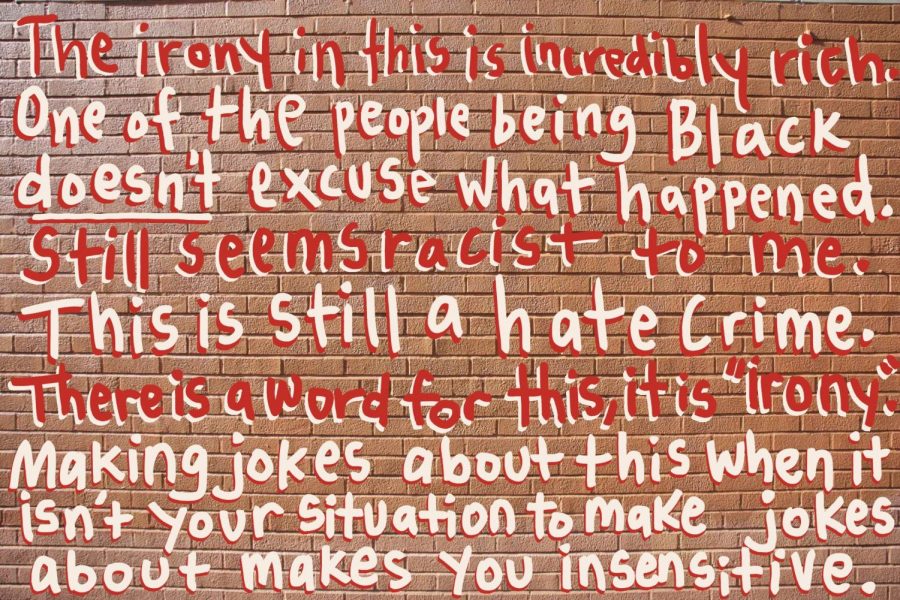
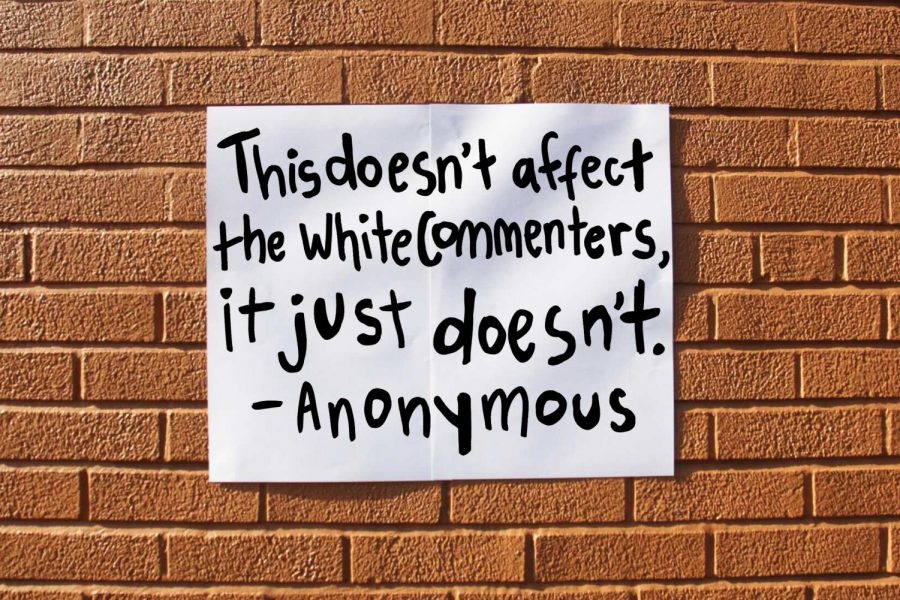
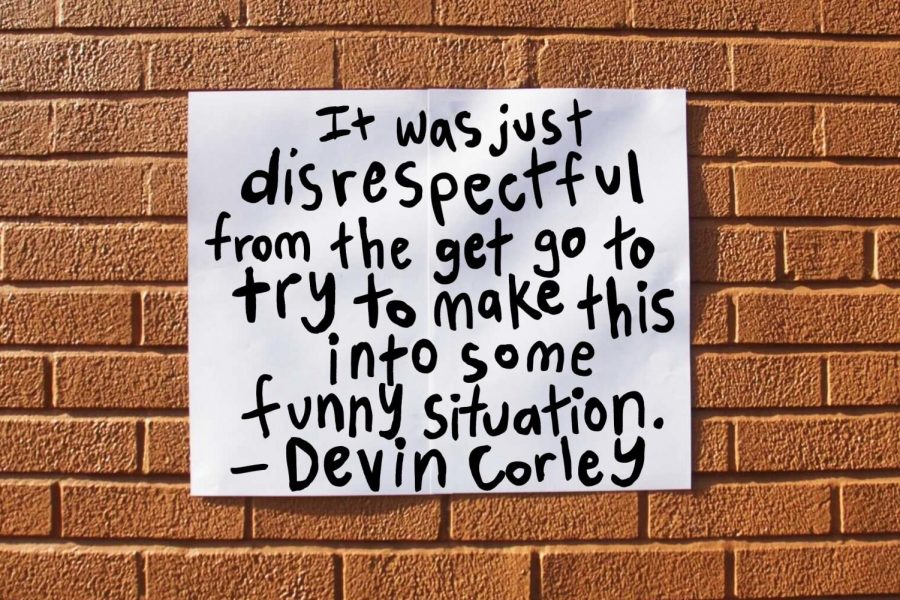
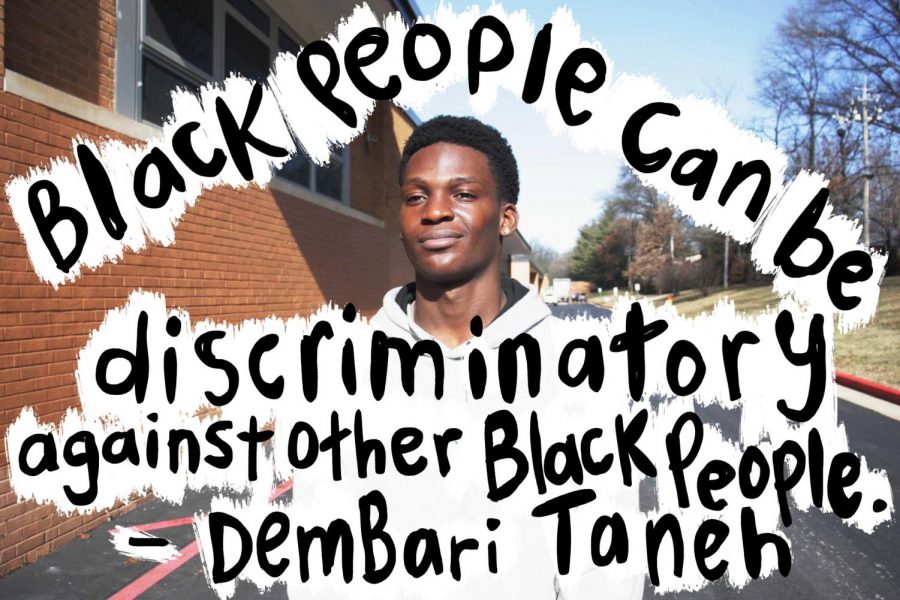
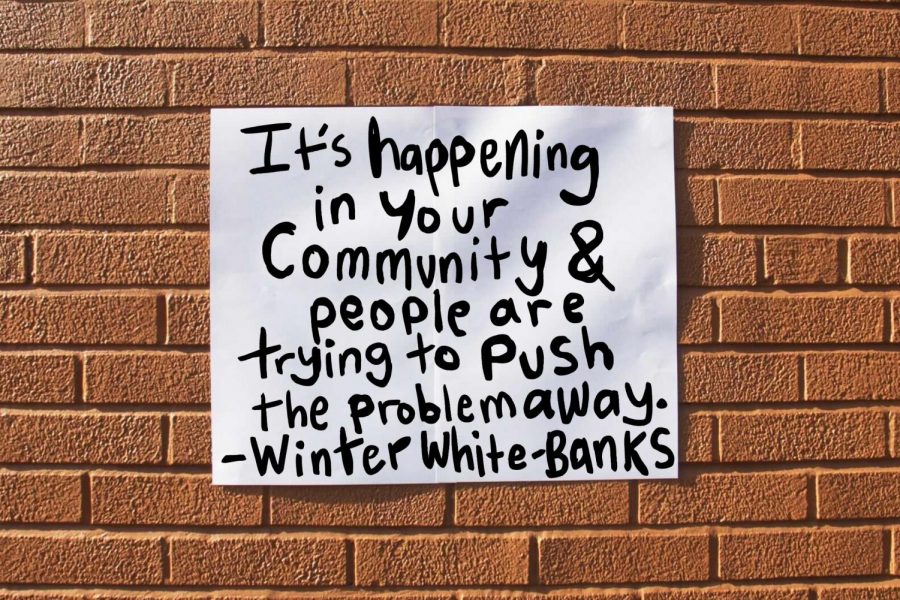
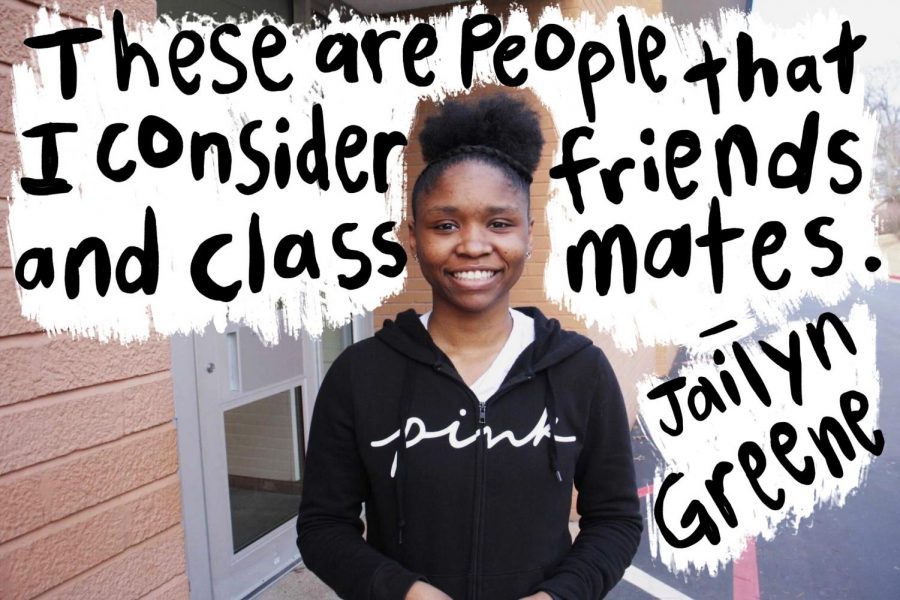
Lauren • Apr 16, 2021 at 11:40 am
This is what is called a FAKE hate crime. It’s when a black person, or a virtue signaling SJW invents a fake hate crime in the absence of any actual racism, to try to prove racism where it doesn’t exist. It’s pathetic that you still try to pretend this is a hate crime after the perpetrators were caught instigating a fraud.